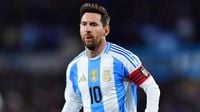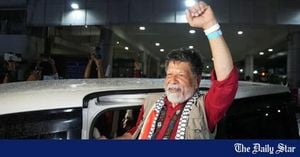On September 6, 2025, the world of football collectively held its breath as Lionel Messi, the talismanic leader of Argentina, delivered yet another masterclass on the pitch—scoring twice in a resounding 4-0 World Cup qualifying victory over Venezuela. But as the final whistle blew at River Plate’s Monumental Stadium, the attention quickly shifted from the scoreboard to the man himself. Tears welled in Messi’s eyes, and with a heartfelt wave to the crowd, the moment felt distinctly like the closing of a chapter—if not the end, then certainly a poignant pause. Was this Messi’s last competitive qualifier on Argentine soil? The question lingered in the humid Buenos Aires air, unanswered and heavy with emotion.
Messi, now 38, has spent much of the past year dodging definitive statements about his international future. The 2026 World Cup, set to be staged across the United States, Mexico, and Canada, looms just over the horizon. Yet, when pressed about whether he’ll defend the crown he so spectacularly lifted in Qatar three years ago, Messi has remained enigmatic. In the wake of the Venezuela match, he avoided giving a clear answer, instead opting for ambiguity and reflection. Then, in a cryptic social media post that quickly went viral, Messi wrote: “A very special night that still leaves me speechless of the emotion. Heartfelt thanks to all the people for the love and for always supporting us. Whatever happens and whatever the future holds, only God knows.. LETS GO ARGENTINA!”
The uncertainty only deepened when Messi announced he would skip Argentina’s final qualifying match against Ecuador, scheduled for September 14, 2025. His reasoning was practical—he wishes to remain fit for his club, Inter Miami, which faces Charlotte in a crucial Major League Soccer fixture on the same date. The decision, while understandable given his age and the demands of top-level football, further fueled speculation. Is the greatest player of his generation quietly preparing for his international farewell?
David Beckham, the co-owner of Inter Miami and a global football icon in his own right, added to the intrigue. In a heartfelt message following what might have been Messi’s last appearance for Argentina, Beckham praised the forward’s relentless pursuit of excellence. “He still wants more,” Beckham declared, hinting that the story may not yet be over. The tribute resonated with fans and pundits alike, underscoring both Messi’s insatiable hunger and the uncertainty surrounding his national team future.
For Argentina, the stakes could hardly be higher. Messi’s legacy is already secure—he delivered the Copa América in 2021, the Finalissima in 2022, and, most importantly, the World Cup in 2022. These triumphs elevated him from national hero to footballing immortal, with images of him hoisting the World Cup trophy in Lusail etched forever into the sport’s collective memory. Anything Messi does from here on out is, as many have said, a bonus—an encore from a man who has given everything to his country.
Yet, international football is a relentless beast. By the time the 2026 World Cup kicks off, Messi will be 39. Very few outfield players have remained effective at that age on the world stage—Lothar Matthäus and Roger Milla come to mind, but they are the exceptions, not the rule. Messi’s game has evolved: he no longer terrorizes defenders with raw pace, but instead orchestrates play from deeper positions, relying on his vision, passing, and set-piece mastery. Still, the physical demands of a month-long tournament against the world’s best cannot be ignored.
Coach Lionel Scaloni, who has masterfully guided Argentina since 2018, faces a delicate challenge. On one hand, Messi’s presence brings leadership and quality that cannot be replicated. On the other, Scaloni must prepare for a future where Argentina no longer leans on its greatest ever player. His solution has been to gradually integrate a new generation of talent—Alejandro Garnacho, Facundo Buonanotte, and the prodigious 16-year-old Franco Mastantuono among them. These young stars have begun to shoulder more responsibility, ensuring that Argentina’s future remains bright, even as the Messi era winds down.
The psychological impact of Messi’s eventual departure cannot be overstated. For nearly two decades, he has not just been Argentina’s best player, but its spiritual center. His presence on the pitch inspires teammates and fans alike, creating an aura that statistics alone cannot measure. The void he will leave—whenever he decides to step away—will be felt far beyond tactics and formations. Argentina’s footballing culture has wrapped itself around Messi in a way that few nations have done with their icons, reminiscent of Brazil with Pelé or Portugal with Cristiano Ronaldo.
History offers cautionary tales. When Diego Maradona retired in the mid-1990s, Argentina endured a turbulent period, struggling to recapture the magic. France, too, floundered after Zinedine Zidane’s exit in 2006, and Portugal now faces its own transition as Ronaldo’s influence wanes. Scaloni’s gradual approach, blending experience with youth, is designed to avoid such pitfalls—ensuring continuity even as the team’s heartbeat inevitably changes.
Messi’s club situation adds another layer of complexity. His move to Inter Miami in Major League Soccer has provided a less grueling schedule than Europe’s top leagues, potentially extending his career. Conveniently, the 2026 World Cup will be played in North America, where Messi now plies his trade. The prospect of ending his international journey on U.S. soil, already familiar and supportive, is tantalizing. But the decision will ultimately hinge on his physical condition, motivation, and, as Messi often says, the happiness of his family.
For Argentina’s football federation, Messi’s ambiguity is both a blessing and a logistical headache. His presence guarantees global attention, ticket sales, and lucrative sponsorships. Every match he plays is a global event. Yet, long-term planning cannot revolve around a single player, no matter how legendary. Youth development and squad depth remain paramount, and Scaloni has proven adept at integrating newcomers without destabilizing the team dynamic.
The fans, meanwhile, are caught in a bittersweet paradox. They dream of seeing Messi play forever, yet fear the sight of a legend overstaying his prime. Memories of Maradona’s troubled farewell in 1994 linger, and no one wants Messi’s story to end in anything less than dignity. Every tear he sheds, every wave to the stands, feels like both a goodbye and a promise of more to come.
Globally, Messi’s uncertain future is emblematic of a generational shift. With Cristiano Ronaldo, Luka Modrić, and Neymar all nearing the end of their careers, football is on the cusp of a new era. Young stars like Kylian Mbappé, Erling Haaland, and Jude Bellingham are rising, but none yet command the universal adoration that Messi enjoys. For Argentina, the challenge is clear: build a team that can thrive with or without their icon.
As the road to 2026 unfolds, one thing is certain—Messi’s legacy is untouchable. Whether he graces the World Cup one last time or decides to watch from the stands, his imprint on Argentina and the game itself will endure. The tears at the Monumental were not of regret, but of gratitude—from Messi to his people, and from his people to their greatest ever player. The next chapter remains unwritten, but the story so far is already the stuff of legend.





